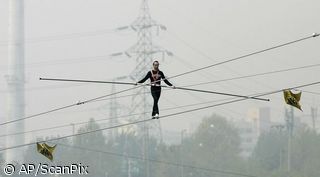Independent journalists and international human rights organizations are concerned about the future of free-press development in Kazakhstan
Published:
20 January 2004 y., Tuesday
Independent journalists and international human rights organizations are concerned about the future of free-press development in Kazakhstan, citing pending media legislation that would effectively give the government the ability to meddle in the operations of news-gathering organizations.
A clear majority in Kazakhstan's lower house of parliament, or Mazhilis, passed the media bill on December 25. Free-speech advocates believe the upper house, or Senate, will approve the bill as early as in mid-February. "We have no hope in the Senate, and [only] a very small hope that the president will reconsider and not sign this draft law," said Irina Petrushova, editor of the opposition Assandi Times newspaper.
Under the law, the Ministry of Information Affairs would have nearly unlimited powers to suspend a media organization's operations. The law places no restrictions on monopolies, and does little to guarantee journalists' rights. The law vaguely states that journalists have a right to gather information. At the same time, the legislation mandates that media organizations perform certain functions as defined by the Ministry of Information - a requirement that critics fear could be used to deny registration to media outlets that anger the government.
Petrushova, one of the bill's most outspoken critics, said the Western reaction to the media bill could play a pivotal role in its future. An outcry against the law by Western government and non-governmental groups could pressure Kazakhstani President Nursultan Nazarbayev not to sign the restrictive legislation. The Assandi Times has already published two so-called "protest editions" with statements from international organizations such as Reporters Without Borders and the World Association of Newspapers that criticize the draft law. The newspaper plans to release additional special editions in January to draw fresh international attention to the legislation. But, so far, such criticism appears to have had little effect.
Šaltinis:
EurasiaNet
Copying, publishing, announcing any information from the News.lt portal without written permission of News.lt editorial office is prohibited.
The most popular articles
 Moon bears pierced with metal tubes to extract an ingredient used in medicine have been saved from captivity in China.
more »
Moon bears pierced with metal tubes to extract an ingredient used in medicine have been saved from captivity in China.
more »
 Georgian acrobat Ramaz Garshaulishvili is trying to revive interest in the circus by demonstrating his rope walking skills.
more »
Georgian acrobat Ramaz Garshaulishvili is trying to revive interest in the circus by demonstrating his rope walking skills.
more »
 The latest trend for New Yorkers who are low on storage space - storing clothes in the oven and kitchen cupboards.
more »
The latest trend for New Yorkers who are low on storage space - storing clothes in the oven and kitchen cupboards.
more »
 Around the world 10 million people live in refugee camps - more than the population of several small European Union countries combined.
more »
Around the world 10 million people live in refugee camps - more than the population of several small European Union countries combined.
more »
 On World Press Freedom Day on 3 May the Commission will officially launch the Lorenzo Natali Prize for 2010.
more »
On World Press Freedom Day on 3 May the Commission will officially launch the Lorenzo Natali Prize for 2010.
more »
 What was once some of Albania's most beautiful coastline has been turned into toxic dumping grounds. Deborah Lutterbeck reports.
more »
What was once some of Albania's most beautiful coastline has been turned into toxic dumping grounds. Deborah Lutterbeck reports.
more »
 A set of two-square-metre capsule apartments in Beijing give struggling individuals a chance to have their own space.
more »
A set of two-square-metre capsule apartments in Beijing give struggling individuals a chance to have their own space.
more »
 The World Bank is adding its weight to efforts to save the world's endangered tigers.
more »
The World Bank is adding its weight to efforts to save the world's endangered tigers.
more »
 The statue of the Little Mermaid that has sat atop Copenhagen's harbour for nearly a hundred years is unveiled at the Shanghai World Expo.
more »
The statue of the Little Mermaid that has sat atop Copenhagen's harbour for nearly a hundred years is unveiled at the Shanghai World Expo.
more »
 Beijing city officials have come up with a novel way to combat the stench of the city's growing rubbish tips.
more »
Beijing city officials have come up with a novel way to combat the stench of the city's growing rubbish tips.
more »